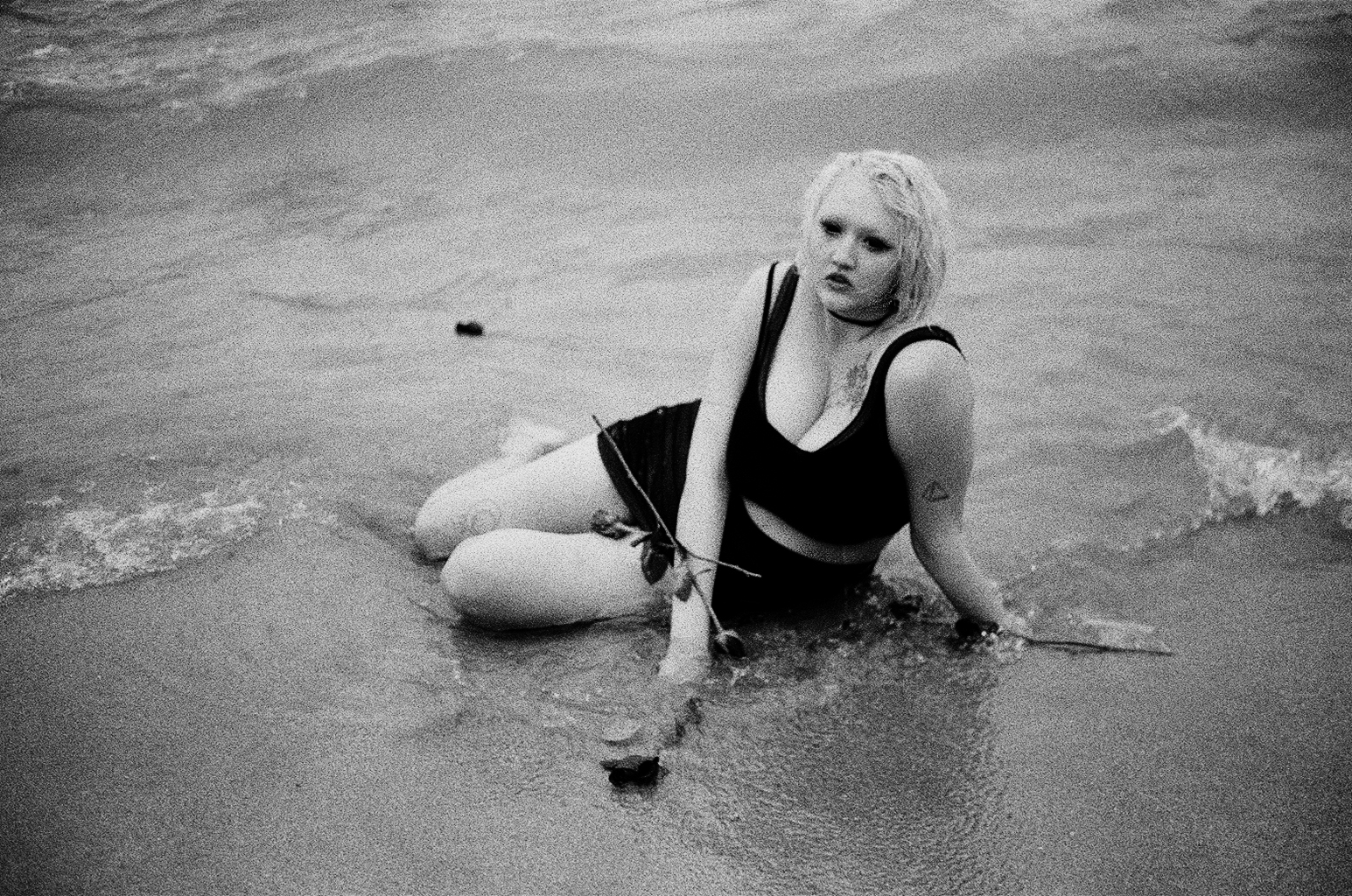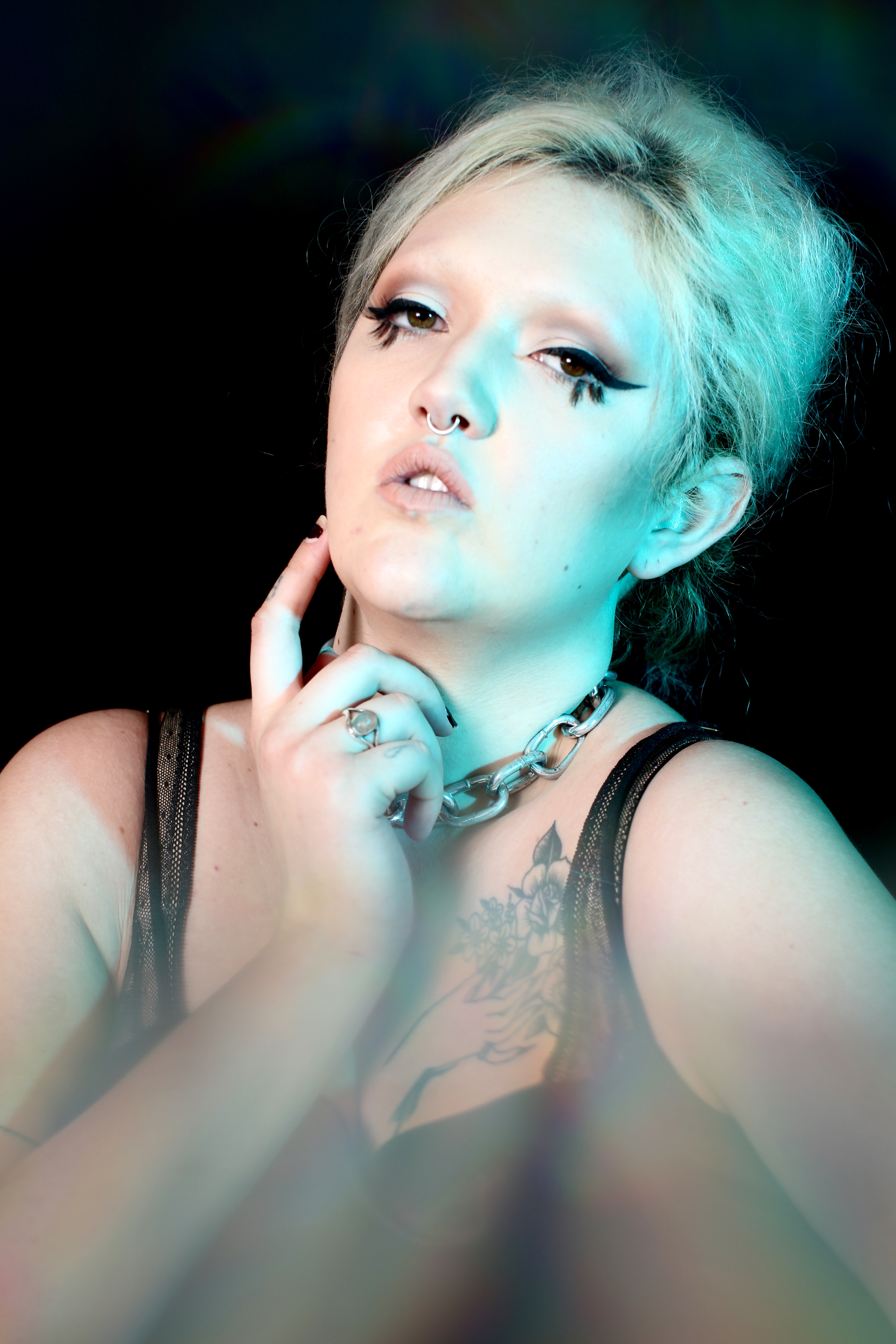Kennedy Ashlyn’s Post-Tragedy Renaissance
Ashlyn a.k.a SRSQ’s ’80s-goth redux follows loss of bandmate and best friend.
Before the shattering Oakland Ghost Ship warehouse fire of 2016, Kennedy Ashlyn was set to tour South America with Them Are Us Too, the dream-pop band she once shared with best friend Cash Askew. Ashlyn and Askew formed Them Are Us Too a day after meeting in college at UC Santa Cruz, where they comprised a tiny minority on campus that might’ve been labeled as “goth”—shorthand for an interest in bands like Cocteau Twins, Joy Division, and Stone Roses. But the band soon found success across the California darkwave landscape and beyond, eventually migrating to respective artist-friendly communities: Askew stayed in Oakland while Ashlyn moved to Dallas, Texas—which is where Ashlyn was when a makeshift Oakland venue known as Ghost Ship caught fire with over a hundred concertgoers trapped inside. Askew was among the 36 who lost their lives that night—the most of any U.S. building fire in over a decade.

After months of catatonia-like grief (she says she doesn’t remember much of the period after the fire) Ashlyn started making music as SRSQ (pronounced seer-skew), releasing her first solo album, Unreality, in October of last year. A spectral wave of electro-nostalgia, the album is a counterpoint to sentimental notions of grief—a blackened phoenix rising. This month she’s embarking on her next leg of shows, sharing billing with synth-pop outfit The Black Queen. And now that Unreality has been licensed by the same Argentinian label that cosigned her and Askew’s would-be tour of South America, Ashlyn’s siren call reaching a global stage has gone from an “unreality” to a real possibility.
Read an in-depth conversation with Ashlyn below.
V How did you and Cash [Askew] meet?
Kennedy Ashlyn We met at her 19th birthday party [which] was kind of jokingly goth-themed. She made the playlist, which was a lot of Joy Division, Stone Roses, New Order, Depeche Mode—all the heavy hitters. But [the party’s theme] was more tongue-in-cheek. Nobody at that school was even remotely close to being goth… Not that she or I have ever really considered ourselves ‘goth.’
V You said you didn’t earnestly consider yourselves “goth.” What was your attitude toward that label? What were the nuances between, like, classic goth and this new sort of goth that you seem to be cultivating?
KA That’s a really interesting question but I have to be careful how I speak on it [laughs]. So we were labeled goth pretty immediately, which as I mentioned didn’t really feel that true to us. Like we weren’t [into] like the lifestyle goth by any means. We always felt personally a little tongue-in-cheek [towards it]. But I know so many people are very serious about it. It’s definitely a very engaged and adoring fan base. So in that respect being involved in more “gothy” [scenes] is really humbling and rewarding.
I see more of a parallel in this new [era] of darkwave music. People like Drab Majesty, Boy Harsher, Tamarin—basically all of my friends. I don’t think I know anybody who self-identifies as a goth, really.
V It seems now like an aesthetic that is kind of fun and pick and choose from, but doing that doesn’t make you a fundamentalist goth, or whatever that would be.
KA Yeah, I certainly am not! But some people certainly are. I appreciate that that exists too. Like, why not? It’s a way for people who felt on the outside to not feel [that way] anymore. I just happen to still feel on the outside in those situations [laughs].

V How did you process the experience of losing Cash into what is ultimately Unreality?
KA It wasn’t very premeditated. The themes and the sounds co-created themselves. I didn’t sit down and go, “I want to write a record about losing Cash, it’s going to be called Unreality and it’s going to start like this and end like this. It kind of just shaped itself as time went on.
I’ve always been vulnerable in my music to an extent, but then having my personally biggest tragedy be fairly public—internationally public actually—[made me] want to show what a really broken person [looks like] in their most private space. So yeah, I kind of just wanted to take control of the lack of boundaries, and put something out that was very personal.
V How long did it take for you to feel like you wanted to start processing through writing music or recording?
KA It’s weird because, in my memory, I was in bed for six months. After I got home [from Oakland] in January, in my head, I didn’t do anything until July. I don’t remember the first five months. But I actually played my first show as SRSQ in May. I just don’t remember what songs I played; It was kind of blacked out. So, there was a lot of drinking, a lot of playing music, and really not much of anything else. A lot of sleeping. It’s really the only way I know how to process emotion or anything at all.
V Did you have a community in Dallas at the time, whether personal or creative, that was important in that process? Or was it more internal?
KA That’s an interesting question because I feel like the community I left… I was definitely a part of an underground arts and music community in Denton, [a suburb of Dallas], before Ghost Ship happened, and I am still friends with a lot of those people. But I found it was really hard for me to come back and feel a part of that community, only on a personal level. Everyone was really supportive and great, I just personally I didn’t feel like I fit in anymore.
I started hanging out in Dallas more often; I think I just needed a different scenery and to be doing a different thing. I think I’ve only been to maybe two warehouse parties since 2016, and I was going to them all the time back in the day. I think it’s just hard for me; it just all feels a little heavy. So I had to find new things that didn’t feel as heavy but are still engaging and artistic and involve great people.
V How has it been touring with the album? How are you feeling ahead of this leg?
KA I’m definitely cautious of becoming emotionally worn out. Sometimes playing these songs is very cathartic and sometimes it just brings me back to a place I don’t want to be. But I am definitely excited to go places I have never been before.
V Any plans to tour internationally?
KA We are doing North America, and I think I have a couple of Canada dates… I don’t know them off of the top of my head. I’m a three-days-at-a-time kind of person.